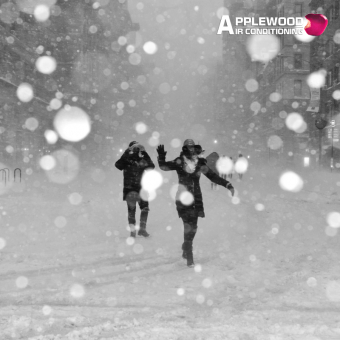February is a month of transition for Ontarians. The weather can dip to freezing temperatures in an instant. Indoors, we can relax and celebrate the love of our family during the Family Day weekend. It is also a month for ramping up new projects for the year at work and school.
Mixed in with the air of change, February can bring with it some extreme weather. You can read more about the general preventative approaches to take during a winter storm here.
In this post, we outline a few important actions to protect your HVAC system during rough weather.
1. Manage snow and ice build up around your home.
If the snow fall is heavy during the storm, be sure to keep your home’s exhaust pipes clear. These pipes should have a 3-foot area of clearance from snow and ice. Buildup from snow and ice can restrict airflow to your HVAC unit.
This in turn can cause failures in condensing units and heat pumps, shortening the lifespan of your unit and causing costly repairs.
A yearly inspection and any required maintenance of your outdoor pipes is a must. These pipes should be well-insulated and without any obvious signs of damage. For your Air Conditioning unit, covering it for the duration of the Canadian winter season is a must.
2. Keep up with maintenance year-round.
Extreme weather is becoming more and more common. From summer hail storms to irregular winter freeze-thaw cycles, we must prepare our HVAC systems for the worst that Mother Nature can throw at us.
Ensure that you keep up with your twice-yearly inspection of your heating and cooling equipment. A professional will be able to identify any necessary maintenance actions for your HVAC unit. They can also provide you with tips on how to prepare your home for winter storms.
3. Prepare for potential side-effects of winter storms.
Winter storms bring with them more than snow and ice. They can also include high winds and sudden floods when the snow melts.
To prepare for any high winds, ensure that your outdoor HVAC units are securely covered. Dust, dirt, and debris can easily get into the unit and cause damage during high winds. Also take a moment to secure any outdoor furniture and appliances, such as barbecues. You do not want these to be blown over or cause other damage to your home during the storm.
Flooding is a particular risk for homeowners who are in low-lying floodplains. Your outdoor units should be installed on raised concrete platforms to minimize the potential risk of flooding. Ensure that your home’s downspouts are directed away from your outdoor HVAC components.
We are almost through the season of intense winter weather. The birds are starting to sing, and each day offers a little more sunshine. Be sure that your HVAC equipment is ready for storms no matter what the season with these three actionable tips!
At Applewood Air, our HVAC expects can help answer any questions that you may have about preventative maintenance for your home’s heating and cooling system. Give us a call to learn more.





